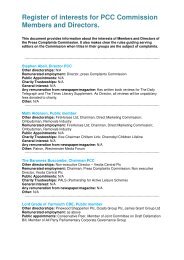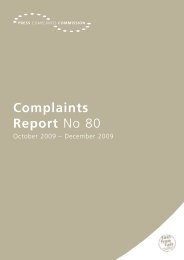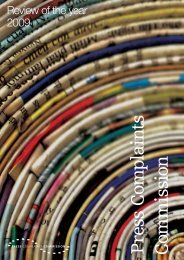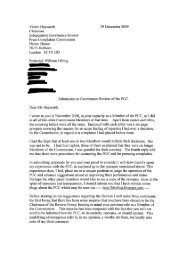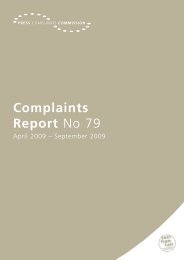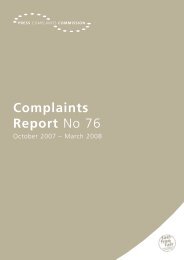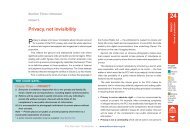2008 - Press Complaints Commission
2008 - Press Complaints Commission
2008 - Press Complaints Commission
Create successful ePaper yourself
Turn your PDF publications into a flip-book with our unique Google optimized e-Paper software.
SPECIAL REPORT –<br />
PRIVACY<br />
C A S E S T U D Y<br />
When the<br />
circumstances<br />
of a story<br />
change<br />
IN MAY 2007, ten-year-old Jordon Lyons drowned in a pond near<br />
Wigan. Two Police Community Support Officers arrived at the scene<br />
several minutes after he disappeared, but did not enter the water<br />
to rescue him. They were widely criticised for not trying to help.<br />
Many newspapers requested interviews with the PCSOs<br />
and their families, which were refused. After the inquest, Greater<br />
Manchester Police asked the PCC to circulate a request that no<br />
further contact be made.<br />
A week later the Telegraph journalist returned to the home<br />
of one of the PCSOs. Greater Manchester Police complained that<br />
this further approach was improper and constituted harassment.<br />
The newspaper argued that it was legitimate to seek further<br />
comment because David Cameron had referred to the case at<br />
the Conservative Party Conference.<br />
The <strong>Commission</strong> considered that David Cameron’s<br />
comments had indeed moved the issue forward. This was a rare<br />
occasion in which the <strong>Commission</strong> agreed that there was a public<br />
interest in overlooking a desist request. The complaint was,<br />
therefore, not upheld.<br />
LESSON A desist request cannot last in perpetuity.<br />
If circumstances of a story change, a further approach<br />
may be appropriate provided it can be justified in the<br />
public interest.<br />
RIGHT: The<br />
parents of<br />
Madeleine<br />
McCann<br />
The Select Committee<br />
Inquiry into <strong>Press</strong><br />
Standards, Privacy<br />
and Libel<br />
In November <strong>2008</strong>, the Culture, Media and Sport Select Committee announced a<br />
major new inquiry following concern about the developing privacy law under the<br />
Human Rights Act and the treatment by the press of the parents of the missing girl<br />
Madeleine McCann. Its report will also consider the role of Conditional Fee<br />
Arrangements and whether the balance between press and personal freedom is fair.<br />
The <strong>Commission</strong> told the Committee<br />
that it has always evolved quickly<br />
in response to changes in cultural<br />
expectations and the state of the law.<br />
It set out the range of what it does to<br />
protect personal privacy (which is greater<br />
than the reach of the courts both in<br />
volume and substance) and why it should<br />
be responsible for setting boundaries<br />
on issues of privacy and press freedom.<br />
It also asked whether judges can<br />
balance the competing cultural,<br />
economic and personal interests<br />
when they forensically apply the law<br />
to individual cases.<br />
The background to the state of the<br />
law is how judges have been interpreting<br />
the Human Rights Act. When the Bill was<br />
being debated in Parliament in 1998,<br />
the then Home Secretary Jack Straw gave<br />
the following reassurance:<br />
“The new clause [in the Bill]<br />
provides an important safeguard by<br />
emphasising the right to freedom of<br />
expression. Our intention is that this<br />
should underline the consequent need<br />
to preserve self-regulation. That effect<br />
is reinforced by highlighting in the<br />
amendment the significance of any<br />
relevant privacy code, which plainly<br />
includes the code operated by the PCC.<br />
I am glad that we have been<br />
able to frame an amendment that reflects<br />
the Government's stated commitment to<br />
the maintenance of a free, responsible<br />
press, and the consequent need for<br />
self-regulation, while maintaining the<br />
protection of the convention that all<br />
our citizens should, and do, enjoy.<br />
I have explained the effect that<br />
we want to achieve with our new clause.<br />
If, for any reason, it does not work as we<br />
envisage, and press freedom appears at<br />
risk, we shall certainly want to look again<br />
at the issue". (Hansard, 2 July 1998,<br />
col. 541.)<br />
In light of concerns expressed<br />
about the actual impact of the Act ten<br />
years on, the Select Committee’s inquiry<br />
will analyse whether the Government’s<br />
intention has been borne out.<br />
10 11





